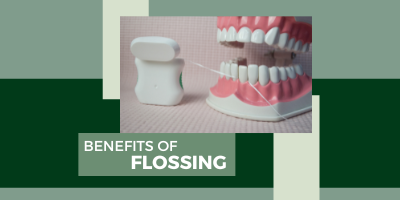
Alongside brushing your teeth twice a day, the American Dental Association recommends flossing daily. Flossing is important because it helps you clean those spaces between your teeth that you can’t reach with your toothbrush. Keep reading to learn all about the benefits of flossing!
Gets rid of plaque
Brushing cleans the surface of your teeth, but you need floss to get into the nooks and crannies of your teeth and gums.
Plaque is a sticky film of bacteria that feeds on food and sugar left between your teeth after eating.
When plaque remains on your teeth, it can harden to a rough substance called tart. Tartar will stay on your gum line and can lead to gum disease.
Studies show that flossing once a day, in addition to brushing twice a day, leads to reduced plaque. This habit does 40% of the work of removing plaque!
Prevents gum disease
When too much bacteria gets left behind, your gums may become swollen and painful. They may also bleed. This is what we call gingivitis: the first sign of gum disease.
Gum disease often starts with gum recession and, in extreme cases, can cause bone loss. Flossing daily, brushing twice a day, and regular checkups will go a long way to preventing gum disease.
Prevents cavities
Plaque, when feeding on leftover food particles in your mouth, releases acid. This acid causes damage to a tooth’s enamel, the hard outer shell of a tooth, and results in cavities. The more plaque build-up you have, the more likely it is you’ll get a cavity. Consistent flossing and brushing will go a long way to avoiding cavities!
Minimizes bad breath
Did you know the decay of leftover food between your teeth can contribute to bad breath? So can plaque build-up! Better breath is just a bonus of flossing!!
When Should I Floss?
Some people think the best time to floss is in the morning. Others think it’s in the evening. Some people think you should brush before you floss. Others think the opposite! The ADA’s recommendation is simple: It doesn’t matter when you floss, so long as you’re doing it!
Ultimately, it’s your dentist and dental hygienist who can give you the best advice based on your personal situation. Book an appointment to learn more about oral hygiene!





